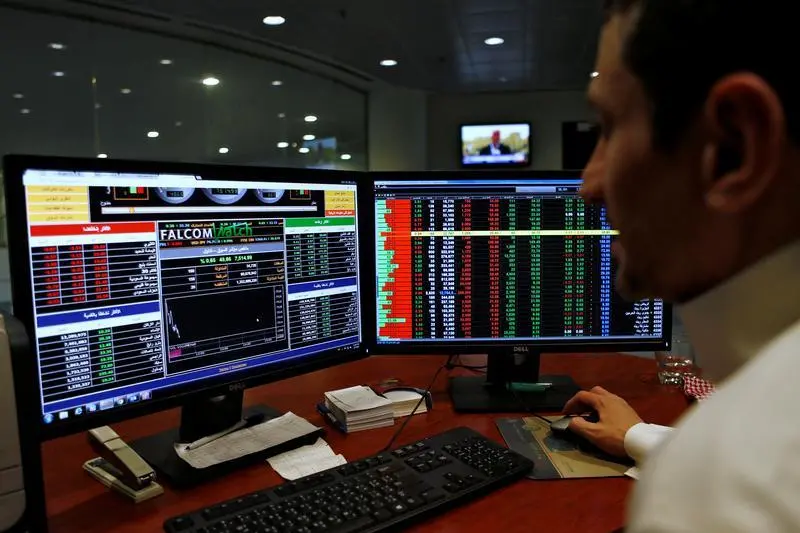PHOTO
Saudi Arabia's stock market was choppy on Tuesday after an announcement by the government on armed drones attacking oil pumping stations in Riyadh wiped out early gains.
Saudi stocks nudged higher, then went into reverse and closed up just 0.1 percent. The index fell as much as 2.1% after Saudi Arabia said drones had struck oil pumping stations two days after Saudi oil tankers were sabotaged off the coast of the United Arab Emirates.
Shares rose 2% in early deals after falling nearly 3.6% on Monday.
"With rising tensions between Iran and the U.S., and with significant naval build-up in the region, markets are sensitive to news and can be tipped by the smallest signs of a conflict," said Mihir Kapadia, chief executive officer of Sun Global Investments.
A Saudi-based banker said government funds were supporting local stocks to limit the downside.
Last year sources told Reuters that when the market was hit in the aftermath of the killing of Saudi journalist Jamal Khashoggi, Saudi Arabia's Public Investment Fund had indirectly supported the market using local institutions.
Al Alamiya and Al Baha Investment and Development tumbled 9.8% and 8.8%, respectively, while heavyweights Riyad Bank slipped 2% and Saudi Telecom 7010.SE fell 2.2%.
In Dubai, the index .DFMGI climbed 3.5% percent, breaking a seven-day losing streak thanks partly to a 5% gain in real estate firm Emaar Properties and its units Emaar Malls and Emaar Development.
Emaar Malls was up 13.8%, while Emaar Development gained 8%. MSCI maintained its decision to keep the two real estate firms in the standard index.
Aldar Properties, the largest property developer in Abu Dhabi, added 2.4% after it reported a rise in its first-quarter development sales.
Abu Dhabi's index fell 2.6%, in its worst day in more than three years. First Abu Dhabi Bank, the largest bank in the United Arab Emirates, dropped 8.6% after index provider MSCI decided against increasing FAB's foreign inclusion factor.
"MSCI has surprisingly decided to maintain FAB's weight in the index, despite the recent foreign ownership limit increase," said Jaap Meijer, head of equity research, at Arqaam Capital.
Despite FAB's increase to its foreign ownership limit to 40% from 25%, MSCI has chosen to remain conservative as there has been no information on the sale of stakes held by the ruling family, Meijer added.
Egypt's blue-chip index, was up 0.9% with Cairo For Investment and Real Estate Development added 3.6% after CI Capital started coverage on the stock with an 'overweight' rating, citing favorable industry dynamics.
Kuwait's indexdropped 1.3%, with 17 of 19 stocks in the index trading in negative territory. Integrated Holding slipped 5.5% after posting a fall in net profit for its first-quarter.
(Reporting by Karina Dsouza in Bengaluru Editing by Gareth Jones) ((Karina.Dsouza@thomsonreuters.com; within U.S. +1 646 223 8780, outside U.S. +91 80 6749 6373; Reuters Messaging: Reuters Messaging: karina.dsouza@thomsonreuters.com))





















